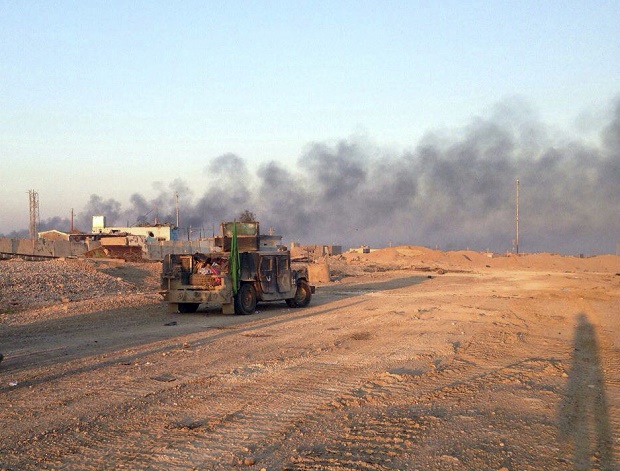
Smoke rises from Islamic State positions following a U.S.-led coalition airstrike as Iraqi Security forces advance their position in Ramadi, 70 miles (115 kilometers) west of Baghdad, Iraq, Tuesday, Dec. 22, 2015. Iraqi forces on Tuesday reported progress in the military operation to retake the city of Ramadi from the Islamic State group, saying they made the most significant incursion into the city since it fell to the militants in May. AP Photo
BAGHDAD, Iraq—Jihadist gunmen and bombers killed at least 12 people in a busy market area of Baghdad while a double blast at a cafe north of the Iraqi capital claimed another 20 lives.
An attack claimed by the Islamic State of Iraq and Syria (ISIS) group and involving suicide explosions, gunfights and hostage-taking in the eastern neighborhood of Baghdad al-Jadida wreaked chaos.
READ: Iraq declares Ramadi liberated from ISIS, sweeps for bombs
“A car came… gunmen came out of it and spread out. They started shooting, killing people, there were lots of dead people,” said a witness, Salman Hussein.
The shocked young man, wearing a black tracksuit, recounted how one of the attackers held a shop owner and spoke on a mobile phone before detonating his suicide belt.
READ: Fall of Ramadi flashpoint hands Iraq forces landmark victory
“The car they came in was laden with explosives and also blew up,” he said.
The head of Baghdad Operations Command, Lieutenant General Abdelamir al-Shammari, insisted to reporters on the scene that the situation was quickly brought under control.
He denied reports by several officials in the Baghdad police and in the interior ministry that the attackers held several people hostage in the nearby Zahrat Baghdad mall.
But a senior police officer said the attackers entered the mall and took hostages after blowing up a car bomb and spraying gunfire on the street.
“When the security forces got too close, they killed three hostages,” he said. Several other sources gave a similar account of events.
The sequence of the attack, a departure from ISIS’ usual modus operandi in Baghdad, remained unclear and the statement posted by the jihadists online provided few details.
It said the attack was carried out by “four soldiers of the caliphate” and targeted Shiites.
It said one of the ISIS members blew himself up in an explosives-laden vehicle when “the apostates sent reinforcements.”
Diyala bombings
ISIS claimed that a total of 90 people were killed or wounded but the group has exaggerated the number of casualties caused by its attacks in previous such statements.
“These people were shooting everywhere, there was even one guy with an RPG,” said Fadhel, another witness from Baghdad al-Jadida, a populous Shiite neighborhood.
“I saw the body of small child strewn on the ground over there, human flesh… What were the sins these people committed to deserve this?” he said.
Police and hospital sources put the casualty toll from the attack, one of the worst to hit Baghdad in months, at 12 dead and more than 30 wounded.
Almost simultaneously, in the late afternoon, bombings killed at least 20 people at a cafe in the town of Muqdadiyah northeast of Baghdad, security officers said.
A bomb exploded at the cafe and a suicide bomber detonated an explosives-rigged vehicle after people gathered at the scene, a police captain and an army colonel said.
IS also claimed the Muqdadiyah attack and named the suicide bomber as Abu Abdallah, an Iraqi.
The security officers said that Shiites set alight several Sunni homes and a mosque following the attack.
The mixed province of Diyala, where Muqdadiyah is located, was declared liberated by the government almost a year ago but attacks have continued.
Iraq’s intelligence services announced on December 24 they had dismantled a major ISIS cell and made 40 arrests in Baghdad and Diyala.
At least three people were killed and eight wounded in another car bomb blast in Nahrawan, south of Baghdad.
Monday’s combined attacks made for one of the worst days of violence in months in areas that are not active frontlines.
ISIS has suffered a number of military setbacks across Iraq in the past year. Security officials say fierce battles and relentless air strikes have depleted its manpower.
Analysts see that as a reason for the drop in attacks targeting civilians in the capital which were an almost daily occurrence two years ago.
The European Union issued a statement expressing its support to Iraq in the aftermath of the attacks and stressing that “these tragic events underline the fragility of the security situation.”

